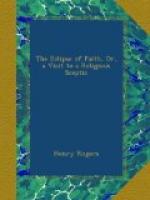I have not the heart at present to give more than the briefest answers to the queries which you so earnestly put to me. No doubt you were startled to find, from the French papers that reached you from Tahiti, and on no less authority than that of the “Apostolic Letter of the Pope,” and Cardinal Wiseman’s “Pastoral,” that this enlightened country was once more, or was on the eve of becoming, a “satellite” of Rome. Subsequent information, touching the course of the almost unprecedented agitation which England has just passed through, will serve to convince you, either that Pio Nono’s supplications to the Virgin and all the English saints, from St. Dunstan downwards, have not been so successful as he flattered himself that they would have been, or that the nation, if it be about to embrace Romanism, has the oddest way of showing it. It has acquired most completely the Jesuitical art of disguising its real feelings; or, as the Anglicans would say, of practising the doctrine of “reserve.” To all appearance the country is more indomitably Protestant than before.
Nor need you alarm yourself—as in truth you seem too much inclined to do—about the machinations and triumphs of the Tractarian party. Their insidious attempts are no doubt a graver evil than the preposterous pretensions of Rome, to which indeed they gave their only chance of success. The evil has been much abated, however by those very assumptions; for it is no longer disguised. Tractarianism is seen to be what many had proclaimed it,—the strict ally of Rome. The hopes it inspired were the causes of the Pope’s presumption and of Wiseman’s folly; and, by misleading them, it has, to a large extent, undone the projects both of Rome and itself. But even before the recent attempts, its successes were very partial.
The degree to which the infection tainted the clergy was no criterion at all of the sympathy of the people. Too many of the former were easily converted to a system which confirmed all their ecclesiastical prejudices, and favored their sacerdotal pretensions; which endowed every youngster upon whom the bishop laid hands with “preternatural graces,” and with the power of working “spiritual miracles.” But the people generally were in little danger of being misled by these absurdities; and facts, even before the recent outbreak, ought to have convinced the clergy, that, if they thought proper to go to Rome, their flocks were by no means prepared to follow them. Except among some fashionable folks here and there,—young ladies to whom ennui, susceptible nerves, and a sentimental imagination made any sort of excitement acceptable; who turned their arks of embroidery and painting, and their love of music, to “spiritual” uses, and displayed their piety and their accomplishments at the same time,—except among these, I say, and those amongst the more ignorant of our rural population whom such people influenced, the Anglican movement could not boast of any signal




